 Petzlover
Petzlover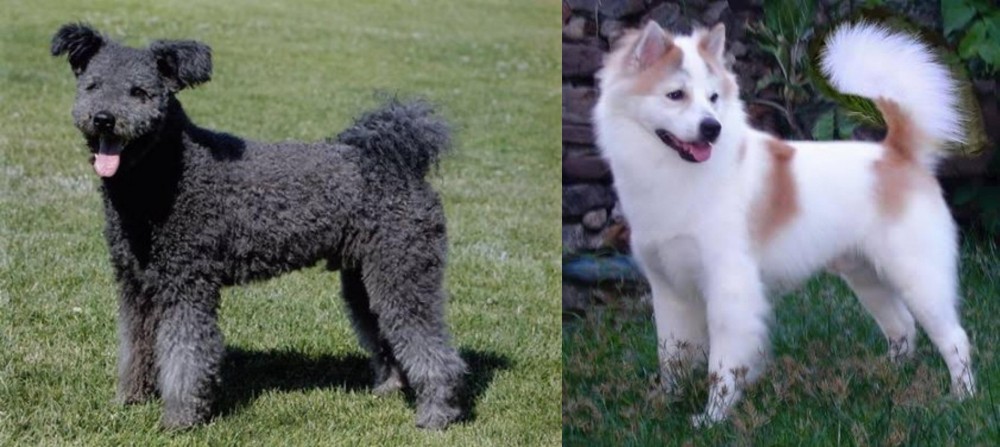 Pumi is originated from Hungary but Thai Bangkaew is originated from Thailand. Pumi may grow 6 cm / 2 inches shorter than Thai Bangkaew. Pumi may weigh 11 kg / 24 pounds lesser than Thai Bangkaew. Both Pumi and Thai Bangkaew has same life span. Both Pumi and Thai Bangkaew has almost same litter size. Both Pumi and Thai Bangkaew requires Moderate Maintenance.
Pumi is originated from Hungary but Thai Bangkaew is originated from Thailand. Pumi may grow 6 cm / 2 inches shorter than Thai Bangkaew. Pumi may weigh 11 kg / 24 pounds lesser than Thai Bangkaew. Both Pumi and Thai Bangkaew has same life span. Both Pumi and Thai Bangkaew has almost same litter size. Both Pumi and Thai Bangkaew requires Moderate Maintenance.
 The Pumi is a small to medium sized dog which comes from Hungary. They have always been used for guarding livestock.
The Pumi is a small to medium sized dog which comes from Hungary. They have always been used for guarding livestock.
It was in 2004 that the the Pumi was accepted by the American Kennel Club Foundation Stock Service program. Also in the country of the dog’s birth, the Pumi Club was founded, and in 2011, the dog was also accepted into the AKC into the Miscellaneous class and into the herding group too.
In the UK in 2015, the Kennel Club also accepted the breed standard
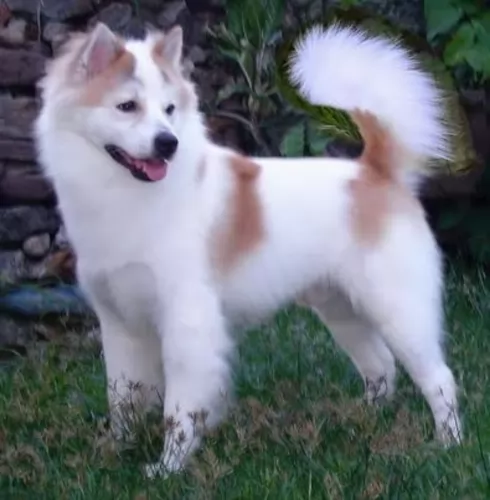 The Thai Bangkaew breed comes from a small village in the Bang Rakarn District of the Phitsanulok Province, in Thailand. The breed is named after that village of Bangkaew. A wild dog was crossed with a Buddhist abbot’s black and white female. Today’s Bangkew is the direct result of breeding only from the litters produced from these original two. Some believe the wild dog was a jackal that is now extinct. The breed is similar to a Spitz and is a good hunter and an intelligent family member. However they still maintain some of the wildness of the jackal.
The Thai Bangkaew breed comes from a small village in the Bang Rakarn District of the Phitsanulok Province, in Thailand. The breed is named after that village of Bangkaew. A wild dog was crossed with a Buddhist abbot’s black and white female. Today’s Bangkew is the direct result of breeding only from the litters produced from these original two. Some believe the wild dog was a jackal that is now extinct. The breed is similar to a Spitz and is a good hunter and an intelligent family member. However they still maintain some of the wildness of the jackal.
The Thai Bangkaew was developed to be a guard dog and alert their owners of any strangers or dangers. By 1957 the dog we know today we being developed through selective breeding. They are not recognized today by the AKC. These facts have made it a very rare breed that is hard to find outside southeast Asia. They are great outdoor companions.
 The coat is a fawn, greyish silver or sandy color. The grey Pumi's are thought to be the more common color.
The coat is a fawn, greyish silver or sandy color. The grey Pumi's are thought to be the more common color.
The medium length coat is thick and curly with the top coat being fairly harsh to the touch.There is very little shedding. The dog has semi-erect, semi-floppy ears which are high set. The eyes are small and dark.
With his tight curly coat, his kinky tail and bright expression, you’d think the Pumi was just for entertainment and a playmate, but he is a serious worker too, loving to be busy, whether for work or play.
The Pumi is lively and bold and always ready for fun and action. He is intelligent too, and early training and socialization will be important to keep him manageable and a pleasure to have around. Because he is smart he won’t have trouble learning. They’re good with children and other dogs in the family.
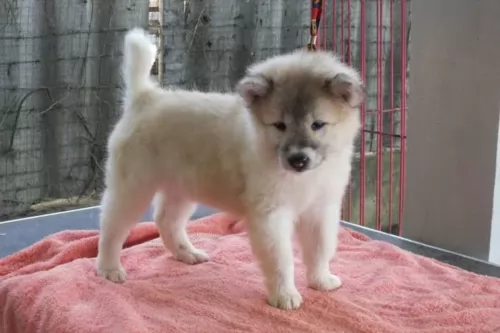 A compact and square dog, the Thai Bangkaew is a well proportioned breed with a gait that is smooth. They have a deep, wide chest with muscular and strong neck. The head is also square, the ears pointed and the eyes brown and average size. They have a double coat and a longer, thicker ruff. Their chest and back also have a ruff like a lion. The tail is plumed and carried up high and curves over the dog’s back. Their coat is water-repellent.
A compact and square dog, the Thai Bangkaew is a well proportioned breed with a gait that is smooth. They have a deep, wide chest with muscular and strong neck. The head is also square, the ears pointed and the eyes brown and average size. They have a double coat and a longer, thicker ruff. Their chest and back also have a ruff like a lion. The tail is plumed and carried up high and curves over the dog’s back. Their coat is water-repellent.
 The Pumi is a comical looking dog which some people assume makes him a bit of a lapdog, but this isn’t true. Yes, he loves to receive love and attention from his human family, but he isn’t a lapdog.
The Pumi is a comical looking dog which some people assume makes him a bit of a lapdog, but this isn’t true. Yes, he loves to receive love and attention from his human family, but he isn’t a lapdog.
He likes to be busy if he can. He is smart and quick to learn and is affectionate, playful, loyal and loving.
His small size allows him to adapt easily to life in the city or the countryside, but he will need to be exercised. If you’re looking for a lively, amicable pet and companion, the Pumi can make an excellent family pet.
 With the Pumi, you’re really getting a robust little dog. With good care, he can push to 14 years of age and even much older. Of course, as with all other dogs, he is prone to some of the more common dog illnesses.
With the Pumi, you’re really getting a robust little dog. With good care, he can push to 14 years of age and even much older. Of course, as with all other dogs, he is prone to some of the more common dog illnesses.
Hip dysplasia is nearly always one that needs to be listed as it is really a common dog ailment that can lead to lameness.
This is an abnormal formation of the hip socket which in its severest form can lead to lameness. Luckily there are advances in veterinary medicine that make it possible for a dog with hip dysplasia to be happy and pain free.
This is an incurable, progressive disease which effects the spinal cord of your dog and is found mostly in older dogs. It’s very sad because as the disease progresses it can lead to loss of coordination in the hind legs, difficulty with supporting weight with the hind legs and also urinary and fecal incontinence.
This is an inherited disease that sadly might require you saying goodbye to your beloved 4-legged family member.
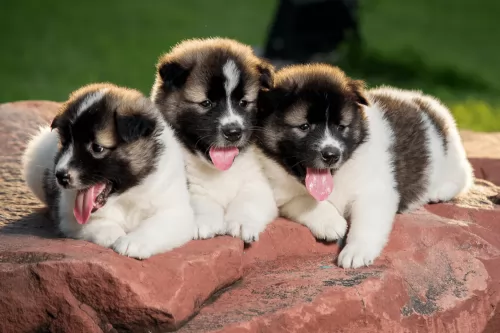 This is a very healthy breed with a relatively clean genentic pool. The dogs tend to be healthy. They have no congenital health issues. However they do contract some normal canine issues.
This is a very healthy breed with a relatively clean genentic pool. The dogs tend to be healthy. They have no congenital health issues. However they do contract some normal canine issues.
 You can never be slack when it comes to choosing food for your pet. If you can provide him with wholesome food then you will be promoting health and longevity.
You can never be slack when it comes to choosing food for your pet. If you can provide him with wholesome food then you will be promoting health and longevity.
If you choose one of the commercially manufactured dog foods, make sure it is the high quality ones full of vitamins and minerals and free from all kinds of colorants and fillers.
Certainly provide him with some home-made food too, but keep it simple and tasty. An excellent home-made diet is boiled chicken, brown rice or pasta, sweet potatoes, carrots and spinach, all chopped up and mixed in twice a week with the dry kibble.
Every now and again, if you can afford it, you can also give him some raw meat added into the kibble. Plain and simple, your pet will thank you for providing him with an uncomplicated diet, gentle on his digestive system.
Make sure he always has a bowl of fresh, cool water available to him.
Energetic and lively, the Pumi is going to need regular exercise as well as mental stimulation. Show him a tennis ball and his eyes will light up as he just loves a game. Take him on a walk and include him in your ball games.
The Pumi’s coat is medium length and curly and he will need it combed to keep it free of matting. The coat will also need to be trimmed if you don’t want it becoming unruly.He isn’t a heavy shedder but will need his coat being attended to twice a week.
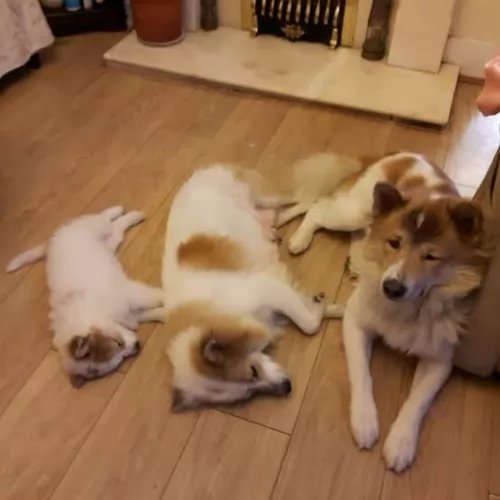 . Feeding the puppy Feed a high quality high protein puppy food for medium sized dog. Feed 2 cups in 3-4 meals per day.
. Feeding the puppy Feed a high quality high protein puppy food for medium sized dog. Feed 2 cups in 3-4 meals per day.
2.Feeding the adult Feed a high quality high protein adult food for medium sized dog. Feed 2.5 cups in 2 meals per day
4. Games and Exercises they need daily exercise and they love to swim. He loves to dig and is a climber as well. Good at herding, barnchase.